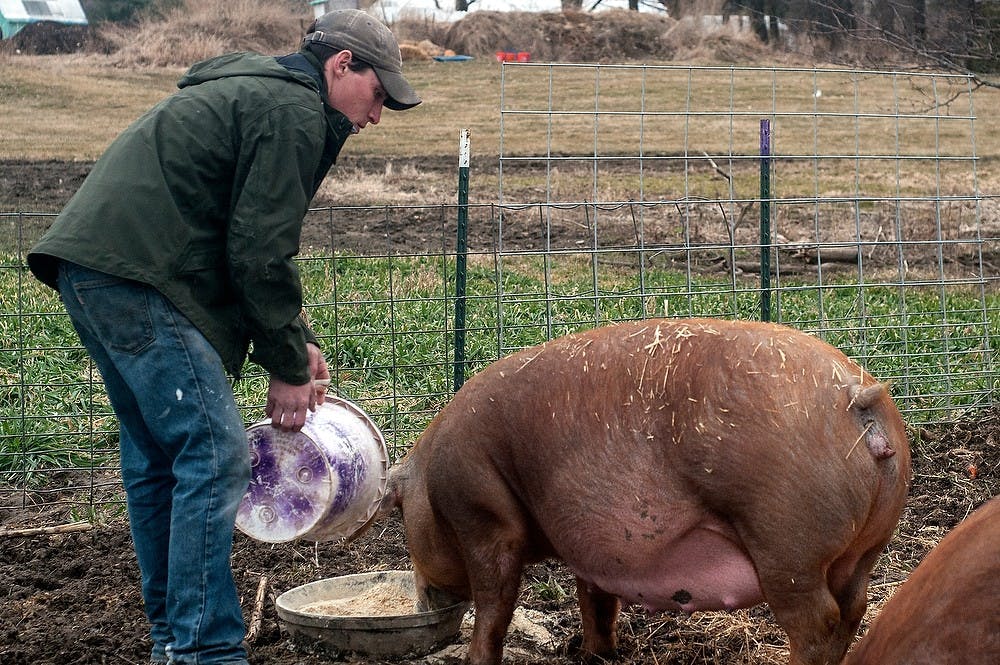Step into any dining hall on campus and an overwhelming amount of food is present.
From tater tots and spaghetti to salads and desserts, MSU does not give its students and staff meals that might be found in a high school cafeteria.
Most of these meals are made on the spot, with the exception being items like bagels, which are made daily by MSU Bakers.
Utilizing the tools provided on campus to produce food for Spartans and letting students be part of the food cycle is important.
Carla Iansiti, Residential and Hospitality Services Sustainability manager, wrote in an email that MSU has always been a pioneer, but the vision is to be “bolder.”
In 2005 President Lou Anna K. Simon introduced Boldness by Design, which has been the framework for the Bolder by Design vision that was introduced in 2012.
Bolder By Design comprises six imperatives to make an impact on accelerating innovation, global impact and pursuing ideas.
“MSU Culinary Services views the university’s Bolder By Design initiatives not as a trend, but as a component of a permanent, evolving business practice,” Iansiti said.
Iansiti said that endorsing Michigan products is a priority.
“The majority of our students are from Michigan and by supporting the state, we are contributing to the Michigan economy and may be making it possible for more students to come to MSU,” Iansiti said.
The importance of members of the MSU community producing food and working with local partners is clear.
But where exactly is the food coming from?
University grown
As a university with roots imbedded in agriculture, it’s no surprise that a great amount of the food provided comes from the university itself.
At the Bailey GREENhouse, which allows students to gain experience in the food cycle and organic growing experiences, a variety of vegetables and herbs are grown and sent to be used in places on campus.
Joe Fox, a horticulture and environmental studies senior and Bailey “Green Team” member, said currently there are plants like lettuce and spinach being grown.
During the summer, he said cucumbers, peppers and squash are grown.
The amount of food that the greenhouse produces varies, but Fox said about 120 pounds of cucumbers a week is possible in the summer.
In addition to the vegetables, the greenhouse also grows herbs such as thyme, oregano and sage.
These products are sent to locations including The State Room restaurant at The Kellogg Hotel and Conference Center and the test kitchen in McDonel Hall.
Fox said supporting local farms is important socially, economically and environmentally because it allows people to get away from relying on big-time factory farms and keep money within the community.
“It’s also important to bring (food) back to the community and get away from TV dinners that are allowing us to become lazy with social interactions,” Fox said. “It’s a really fun time to gather around fresh cooking.”
The GREENhouse isn’t the only campus organization to produce food for the community.
The Student Organic Farm grows products for students by students that include vegetables and other organic foods for Brody Square and Yakeley Dining Hall.
Another program, MSU Beef, is a partial partnership with the Department of Animal Science and supplies beef served in both dining halls and the MSU food truck.
Iansiti said culinary services is not the only one to benefit from partnering with organizations like Student Organic Farm.
“The relationships that evolved over the years with academics has proven to help provide a living learning laboratory for the students,” Iansiti said
From the farm to MSU
Not every food product MSU serves is grown and made on campus, but the university connects itself with local and regional producers to strengthen the the ties between MSU and the community.
In Michigan and other neighboring states, many local farmers and vendors produce goods which make their way into the dining halls and retail dining shops on campus.
The Farm to MSU program encourages this connection between MSU and local or regional partners.
Farmers who utilize sustainable farming techniques, such as crop rotation or crop diversity, are able to provide some of the fresh food items available on campus.
The program allows Michigan farmers, processors and distributors to market their goods and services in their home state while providing the MSU community with fresh, local foods when they are in season.
In addition to working with farms, MSU Culinary Services partners with 153 local and 314 regional vendors.
Among those vendors is Paramount Coffee in Lansing which provides organic and fair-trade coffee in dining halls and at Sparty’s locations.
Woody’s Oasis, which originally opened in East Lansing, also works with culinary services and Kosher Meal Service program is made possible in part of the partnership.
Dr. John Biernbaum, horticulture professor and one of the founders of the Student Organic Farm, said utilizing local farms makes sense – and it benefits the state.
“All those dollars stay here in Michigan, and then they tend to lead to more jobs and more cycling of dollars in the economy,” Biernbaum said.
Producers to consumers
Pick up a tray and go to one of the stations in the dining hall and sometimes the choices available are a complete mystery.
Alexis Rife, an anthropology sophomore, said at The Gallery between Snyder and Phillips Halls, this happens often.
She said there is one section of the food court, choices are often meant to appeal to international students but she thinks more could be done to educate other students on the dishes.
“I feel like if they told you more about what you’re eating, then more people would actually eat in the cafeteria,” Rife said. “People are afraid to try what they don’t know anything about.”
Students also question other elements of the cuisine.
In a previous State News article, Kat Cooper, communications manager for Residential and Hospitality Services, said the shortfin mako shark served in the dining hall was a U.S. domestic product and not from Argentina – which had originally sparked controversy.
“This domestic product is considered sustainable by our Monterey Bay Seafood Watch, who helps inform our sustainable practices,” Cooper said in the article.
When it comes time to choose a meal, students are more likely to gravitate towards picking something they are familiar with, and Fife said this might help decrease the amount of food wasted.
In the food cycle, from producers to consumers which then creates waste, Fox said it is important to close the food cycle.
“Knowing where your food comes from is really important but also trying to put it back into the system and looking to recycle and compost food waste,” Fox said.
Staff reporter Rachel Fradette contributed to this article. Look for her story next week on composting and the waste from MSU dining halls.





